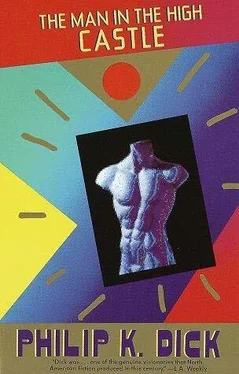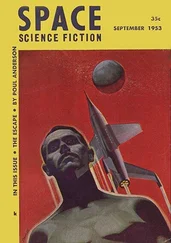Interrupting, Joe said, “You know what he’s done, don’t you? He’s taken the best about Nazism, the socialist part, the Todt Organization and the economic advances we got through Speer, and who’s he giving the credit to? The New Deal. And he’s left out the bad part, the SS part, the racial extermination and segregation. It’s a utopia! You imagine if the Allies had won, the New Deal would have been able to revive the economy and make those socialist welfare improvements, like he says? Hell no; he’s talking about a form of state syndicalism, the corporate state, like we developed under the Duce. He’s saying, You would have had all the good and none of—”
“Let me read,” she said fiercely.
He shrugged. But he did cease babbling. She read on at once, but to herself.
…And these markets, the countless millions of China, set the factories in Detroit and Chicago to humming; that vast mouth could never be filled, those people could not in a hundred years be given enough trucks or bricks or steel ingots or clothing or typewriters or canned peas or clocks or radios or nose-drops. The American workman, by 1960, had the highest standard of living in the world, and all due to what they genteelly called “the most favored nation” clause in every commercial transaction with the East. The U.S. no longer occupied Japan, and she had never occupied China; and yet the fact could not be disputed: Canton and Tokyo and Shanghai did not buy from the British; they bought American. And with each sale, the workingman in Baltimore or Los Angeles or Atlanta saw a little more prosperity.
It seemed to the planners, the men of vision in the White House, that they had almost achieved their goal. The exploring rocket ships would soon nose cautiously out into the void from a world that had at last seen an end to its age-old griefs: hunger, plague, war, ignorance. In the British Empire, equal measures toward social and economic progress had brought similar relief to the masses in India, Burma, Africa, the Middle East. The factories of the Ruhr, Manchester, of the Saar, the oil of Baku, all flowed and interacted in intricate but effective harmony; the populations of Europe basked in what appeared…
“I think they should be the rulers,” Juliana said, pausing. “They always were the best. The British.”
Joe said nothing to that, although she waited. At last she went on reading.
…Realization of Napoleon’s vision: rational homogeneity of the diverse ethnic strains which had squabbled and balkanized Europe since the collapse of Rome. Vision, too, of Charlemagne: united Christendom, totally at peace not only with itself but with the balance of the world. And yet—there still remained one annoying sore.
Singapore.
The Malay States held a large Chinese population, mostly of the enterprising business class, and these thrifty, industrious bourgeois saw in American administration of China a more equitable treatment of what was called “the native.” Under British rule, the darker races were excluded from the country clubs, the hotels, the better restaurants; they found themselves, as in archaic times, confined to particular sections of the train and bus and—perhaps worst of all—limited to their choice of residence within each city. These “natives” discerned, and noted in their table conversations and newspapers, that in the U. S. A. the color problem had by 1950 been solved. Whites and Negroes lived and worked and ate shoulder by shoulder, even in the Deep South; World War Two had ended discrimination…
“Is there trouble?” Juliana asked Joe.
He grunted, keeping his eyes on the road.
“Tell me what happens,” she said. “I know I won’t get to finish it; we’ll be in Denver pretty soon. Do America and Britain get into a war, and one emerges as ruler of the world?”
Presently Joe said, “In some ways it’s not a bad book. He works all the details out; the U.S. has the Pacific, about like our East Asia Co-Prosperity Sphere. They divide Russia. It works for around ten years. Then there’s trouble—naturally.”
“Why naturally?”
“Human nature.” Joe added, “Nature of states. Suspicion, fear, greed. Churchill thinks the U.S.A. is undermining British rule in South Asia by appealing to the large Chinese populations, who naturally are pro-U.S.A., due to Chiang Kai-shek. The British start setting up”—he grinned at her briefly—”what are called ‘detention preserves.’ Concentration camps, in other words. For thousands of maybe disloyal Chinese. They’re accused of sabotage and propaganda. Churchill is so—”
“You mean he’s still in power? Wouldn’t he be around ninety?”
Joe said, “That’s where the British system has it over the American. Every eight years the U.S. boots out its leaders, no matter how qualified—but Churchill just stays on. The U.S. doesn’t have any leadership like him, after Tugwell. Just nonentities. And the older he gets, the more autocratic and rigid he gets—Churchill, I mean. Until by 1960, he’s like some old warlord out of Central Asia; nobody can cross him. He’s been in power twenty years.”
“Good God,” she said, leafing through the last part of the book, searching for verification of what Joe was saying.
“On that I agree,” Joe said. “Churchill was the one good leader the British had during the war; if they’d retained him they’d have been better off. I tell you; a state is no better than its leader. Fuhrerprinzip –Principle of Leadership, like the Nazis say. They’re right. Even this Abendsen has to face that. Sure, the U.S.A. expands economically after winning the war over Japan, because it’s got that huge market in Asia that it’s wrested from the Japs. But that’s not enough; that’s got no spirituality. Not that the British have. They’re both plutocracies, rule by the rich. If they had won, all they’d have thought about was making more money, that upper class. Abendsen, he’s wrong; there would be no social reform, no welfare public works plans—the Anglo-Saxon plutocrats wouldn’t have permitted it.”
Juliana thought, Spoken like a devout Fascist.
Evidently Joe perceived by her expression what she was thinking; he turned toward her, slowing the car, one eye on her, one on the cars ahead. “Listen, I’m not an intellectual. Fascism has no need of that. What is wanted is the deed . Theory derives from action. What our corporate state demands from us is comprehension of the social forces of history. You see? I tell you; I know, Juliana.” His tone was earnest, almost beseeching. “Those old rotten money-run empires, Britain and France and U.S.A., although the latter actually a sort of bastard sideshoot, not strictly empire, but money-oriented even so. They had no soul, so naturally no future. No growth. Nazis a bunch of street thugs; I agree. You agree? Right?”
She had to smile; his Italian mannerisms had overpowered him in his attempt to drive and make his speech simultaneously.
“Abendsen talks like it’s big issue as to whether U.S. or Britain ultimately wins out. Bull! Has no merit, no history to it. Six of one, dozen of other. You ever read what the Duce wrote? Inspired. Beautiful man. Beautiful writing. Explains the underlying actuality of every event. Real issue in war was: old versus new. Money—that’s why Nazis dragged Jewish question mistakenly into it—versus communal mass spirit, what Nazis call Gemeinschaft –folkness. Like Soviet. Commune. Right? Only, Communists sneaked in Pan-Slavic Peter the Great empire ambitions along with it, made social reform means for imperial ambitions.”
Juliana thought, Like Mussolini did. Exactly.
“Nazi thuggery a tragedy,” Joe stuttered away as he passed a slow-moving truck. “But change’s always harsh on the loser. Nothing new. Look at previous revolutions such as French. Or Cromwell against Irish. Too much philosophy in Germanic temperament; too much theater, too. All those rallies. You never find true Fascist talking, only doing—like me. Right?”
Читать дальше










